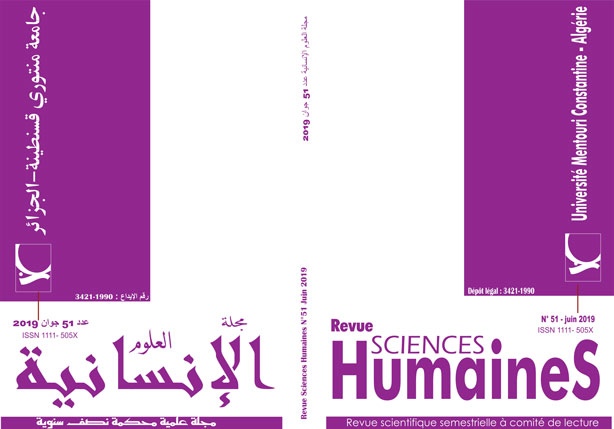Direct and Indirect Lexical Origins of the Dialect of Constantine
Mots-clés :
Dialect of Constantine, Etymology, Direct and indirect Lexical LoansRésumé
The dialect of Constantine is the one spoken in the region of Constantine, situated in the eastern side of Algeria. It is unstandardised and considered as an under-resource language. The aim of this paper is to describe the direct and indirect loan words’ origins of the linguistic system used on a daily basis by the population of the city of Constantine. A historical background of the city is provided to understand the features of its linguistic levels. The specificities of the language are described and exemplified. Using an etymological approach, the different lexical origins are highlighted. The emphasis is laid on the direct and indirect origins of its lexis.
Téléchargements
Références
(1) -Now written as Jijel.
(2 ) -Known as Skikda at the present time
(3) - (Miller, 2007)and(Barkat, 2000) sedentary versus rural paradigm became so prevalent, because cities are much influenced by the surrounding villages
(4) - Tables of both consonants and vowels transliteration is provided below in the appendix after the references
(5) -A tomato soup with grained barley.
(6) - A dialect spoken in the city of Jijel in Algeria
(7) -This phonetic symbol is adopted from (Holes, 2004)
(8) -A traditional meal made out of small chipped slices of baked dough, sprinkled by a tomato and meat sauce.
(9) - Examples of each sound are provided in the table of vowels in the appendix.
(10) -Those who are authentically from Constantine.
(11) - From ( Marçais P. , 1957)
(12) - From (Ostoya-Delmas, 1937)
(13) -“ Les diminutif, leur emploi n’est jamais spontané dans les parlers des hommes. Il est considéré comme des parole des femmes à propos des enfants.”(79). (The diminutive, their use is never spontaneous in the speeches of men. It is considered women's words about children) (translated by the author)
(14) -example taken from ( Marçais P. , 1957)
(15) -A traditions circular baked bread
(16) -from (Ait-Oumeziane R. , 1986)
(17) -Example from(Lathan, 1973)
(18) -(Felicity, 1989)(Higa, 1980) (Mojela, 1991)
(19) -Example taken from (Cherbonneau, 1869)
(20) - The examples are taking from (Guella, 2011; Ostoya-Delmas, 1937; Tilmatine, 1999)
(21) -Examples from (Guella; 2011; Khelef, 2011; Lathan, 1973; Ostoya-Delmas, 1937; Souag, 2005)
(22) - From the Andalusian Arabic word /sefunariya /
(23) - A Ratatouille like meal, made out of a plant called /baṛdqala/, cubes shopped potatoes and chickpeas.
(24) -A crispy baked bread.
(25) -Bar-Asher, 1996) and (Cohen, 1912)
(26) - In CD it is used to express anger or disappointment. also an interjection to express a long duration of time)
(27) - The Algerian people use it as a connotation to abase the importance of a rabbi for the Jews meaning dishonest and mischievous, example from (Cohen, 1912)
(28) -Qualifies any meat slaughter according to the Jewish religious rituals prescribed. Example taken from (Cashér, 2017) (Cohen, 1912)
(29) - In Jewish language it is used to refer to any married woman whose husband has disappeared without knowing if he is dead or alive. (Cohen, 1912)
(30) - From (Ben Cheneb, 1922)
(31) -A musical genre sang in Constantine
(32) - Example taken from (Ben Cheneb, 1922)
(33) -Example from(Ben Cheneb, 1922)
(34) -Example from (Ben Cheneb, 1922)
(35) -In CD it could also mean an earring or an oval plateare taken from ( Kahane & Kahane, 1942)
(36) -And
(37) -Example from (Guella, 2011) and (Cohen, 1912)
(38) -And
(39) -From online dictionary (Bounya بُونْيَة, 2017), (Chita شِيتَة, 2017) and (Cohen, 1912)
(40) - This adjective collocates only with / zi:(aᶦ)ts / (oil) e.g. / zi:(aᶦ)tssangu:/ a tasteless oil.
(41) -Even though the paper highlights only the English words that exist thanks to technology. CD’s vocabulary contains many others that were borrowed from the French language like: short, parking, slip and sandwich
(42) - It is a smart phone application used to share data
(43) - Examples from (Ben Cheneb, 1922)
(44) -The original word was used to design a frying pan
(45) - For more examples consult (Ennaji, 1991)
(46) -Examples taken from (Guella, 2011)
(47) -In Latin it means a sort of olive oil and water mixture
(48) - From online dictionary (Bellaredj بْلَّارَجْ, 2017)
(49) - In Dutch it means an apple from China to designate an orange












